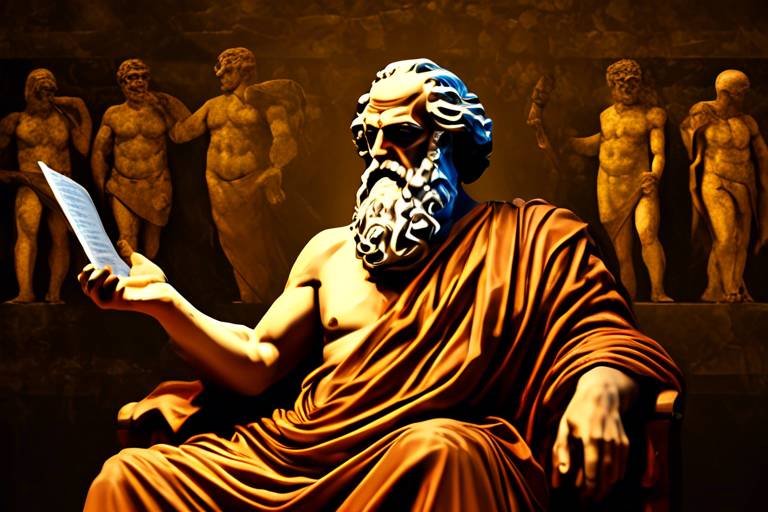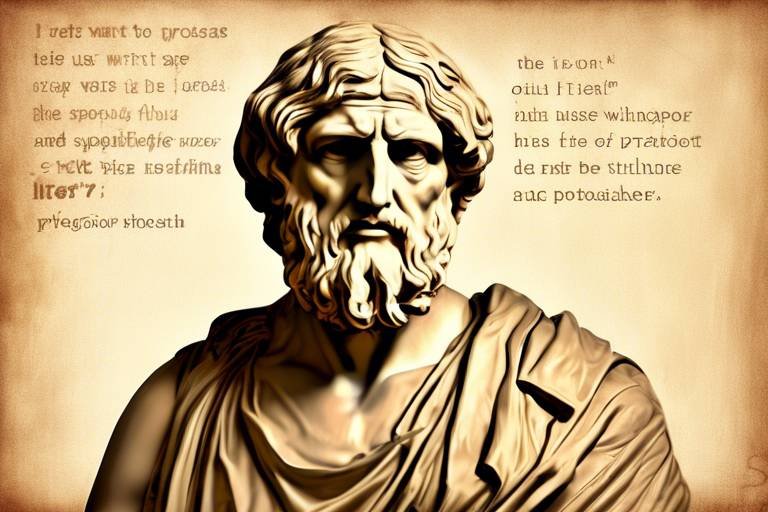What Made Anaximander a Pre-Socratic Philosopher?
When we think about the dawn of Western philosophy, one name that often pops up is Anaximander. But what exactly makes him a Pre-Socratic philosopher? To answer this, we need to dive into the rich tapestry of his thoughts and contributions that laid the groundwork for future philosophical inquiries. Anaximander was not just a thinker; he was a revolutionary who challenged the conventional wisdom of his time. His ideas about the cosmos, ethics, and existence were groundbreaking, and they opened the door for subsequent philosophers to explore deeper questions about reality.
Born in Miletus around 610 BCE, Anaximander was a student of Thales, who is often regarded as the first philosopher in Western history. While Thales focused on the tangible elements of nature, Anaximander took a leap into the abstract, proposing that the origin of all things is the apeiron, or the boundless. This concept was radical for its time, suggesting that the universe is not limited by physical forms but is instead an infinite expanse of potential. In a way, you could think of the apeiron as the ocean of possibilities from which all things emerge—a notion that was both profound and perplexing.
What truly sets Anaximander apart as a Pre-Socratic philosopher is his method of inquiry. Unlike his predecessors who often relied on mythological explanations for natural phenomena, Anaximander sought to understand the world through reason and observation. This shift from mythos to logos marks a significant evolution in human thought, paving the way for a more scientific approach to understanding nature. His work represents a crucial turning point where philosophy begins to break free from the constraints of mythology, allowing for a more rational exploration of existence.
Furthermore, Anaximander's contributions extend beyond cosmology. He ventured into the realms of ethics and politics, emphasizing the importance of balance and justice in human affairs. His belief that everything in the universe is interconnected reflects a profound understanding of the moral implications of human actions. In his view, living a just life meant adhering to the natural order, which resonates with contemporary discussions about ethics and morality.
In summary, Anaximander's significance as a Pre-Socratic philosopher lies in his innovative ideas that challenged the status quo and set the stage for future philosophical exploration. His shift from mythological explanations to rational inquiry, along with his groundbreaking concepts of the infinite and interconnectedness, marks him as a pivotal figure in the history of philosophy. So, the next time you ponder the mysteries of existence or the fabric of the universe, remember that Anaximander was one of the first to ask those questions, and his legacy continues to inspire thinkers today.
- Who was Anaximander? Anaximander was a Pre-Socratic philosopher from Miletus, known for his contributions to cosmology, ethics, and the concept of the apeiron.
- What is the apeiron? The apeiron refers to the boundless or infinite, which Anaximander proposed as the source of all things.
- How did Anaximander influence later philosophers? Anaximander's shift from mythological to rational explanations paved the way for future philosophers, including Plato and Aristotle, to explore deeper philosophical questions.
- What were Anaximander's views on ethics? He emphasized the importance of balance and justice, suggesting that moral behavior should align with the natural order of the universe.

Historical Context
Understanding the historical backdrop of Anaximander's life is crucial to appreciating his philosophical contributions and the intellectual climate of ancient Greece during the Pre-Socratic period. The 6th century BCE was a time of profound transformation in the Greek world, marked by a shift from mythological explanations of the universe to a more rational and systematic inquiry into the nature of existence. This era saw the rise of several thinkers who sought to understand the cosmos through observation and reason rather than relying solely on traditional myths and religious beliefs.
During Anaximander's time, the city of Miletus, where he was born, was a thriving center of trade and culture. The exchange of ideas was rampant, and the intellectual environment was ripe for philosophical exploration. Anaximander, as a member of this vibrant community, was influenced by the earlier works of his mentor Thales, who is often credited as the first philosopher. Thales proposed that water is the fundamental substance of all things, setting the stage for Anaximander to further explore the nature of reality.
In the broader context, the Pre-Socratic philosophers were not merely thinkers; they were pioneers in a new way of understanding the world. They began to question the origins of the universe and the principles governing existence. Anaximander's contemporaries, such as Heraclitus and Pythagoras, were also grappling with similar questions, leading to a rich tapestry of philosophical discourse. This period can be seen as a foundational moment in Western philosophy, where the seeds of scientific inquiry and rational thought were first sown.
To fully grasp the significance of Anaximander's ideas, it's essential to recognize the key themes that characterized the Pre-Socratic era:
- Transition from Mythos to Logos: The shift from mythological explanations to logical reasoning.
- Exploration of the Cosmos: A growing interest in the nature of the universe and its origins.
- Development of Ethical Thought: Early inquiries into morality and human existence.
This intellectual climate not only influenced Anaximander but also laid the groundwork for future philosophers, who would build upon his ideas. His contributions were not isolated; they were part of a larger movement that sought to understand the world through observation, reason, and dialogue. Anaximander's exploration of concepts like the apeiron (the boundless) reflected this new way of thinking, challenging the traditional notions of a defined cosmos and pushing the boundaries of philosophical inquiry.
In summary, the historical context of Anaximander's life is a fascinating tapestry of cultural, intellectual, and philosophical developments. His contributions were shaped by the vibrant milieu of ancient Greece, where the quest for knowledge and understanding was just beginning to take root. This period of transition, marked by a departure from myth and the embrace of reason, set the stage for Anaximander's groundbreaking ideas that would resonate through the ages.

Biographical Overview
Anaximander, a pivotal figure in early Greek philosophy, was born around 610 BCE in the ancient city of Miletus, located on the western coast of Asia Minor. His life unfolded during a time of profound intellectual exploration, where thinkers began to seek explanations for the natural world beyond mythology. Anaximander is often regarded as a student of Thales, the first known philosopher, and he inherited a rich tradition of inquiry that shaped his own philosophical pursuits. His contributions not only reflect his innovative spirit but also the vibrant intellectual climate of the Pre-Socratic era.
While specific details about Anaximander's life remain scarce, historical accounts suggest that he was deeply influenced by the teachings of Thales, who posited that water is the fundamental principle of all things. Anaximander took this idea a step further, introducing the concept of the apeiron, or the boundless, as the source of all existence. This shift marked a significant departure from his mentor's views, showcasing Anaximander's ability to think critically and innovate within the philosophical discourse of his time.
His works, although mostly lost to history, are believed to have included a cosmological treatise that explored the nature of the universe and humanity's place within it. Anaximander's ideas were not just theoretical; they were deeply intertwined with the practical realities of life in Miletus. He was not only a philosopher but also a cartographer and astronomer, contributing to the understanding of geography and celestial phenomena. His diverse interests exemplify a holistic approach to knowledge, where philosophy, science, and art intersected.
Moreover, Anaximander's legacy is characterized by a commitment to seeking knowledge through observation and reason. He emphasized the importance of empirical evidence, laying the groundwork for future scientific inquiry. His philosophical outlook was not merely abstract; it engaged with the ethical and political dimensions of human existence. Anaximander's thoughts on justice and balance in human affairs highlight his understanding of the interconnectedness of all things, a theme that resonates throughout Western philosophy.
In summary, Anaximander's life and works represent a crucial chapter in the evolution of philosophical thought. His innovative ideas and interdisciplinary approach not only reflect the spirit of the Pre-Socratic era but also continue to inspire contemporary discussions in philosophy, science, and ethics. As we delve deeper into his contributions, we uncover a thinker who was not afraid to challenge established norms and explore the mysteries of existence.
- Who was Anaximander? Anaximander was a Pre-Socratic philosopher from Miletus, known for his contributions to cosmology, ethics, and the nature of existence.
- What is the apeiron? The apeiron, or the boundless, is a concept introduced by Anaximander, suggesting that it is the source of all things in the universe.
- How did Anaximander influence later philosophers? Anaximander's ideas laid the groundwork for future philosophical inquiries, particularly in cosmology and ethics, influencing thinkers like Plato and Aristotle.

Influence of Thales
When we delve into the philosophical landscape of ancient Greece, one name that stands out is Thales of Miletus. Often regarded as the first philosopher in Western history, Thales laid the groundwork for many thinkers who followed him, including Anaximander. As a student of Thales, Anaximander was profoundly influenced by his mentor's quest for understanding the fundamental nature of reality. Thales famously proposed that water is the essence of all things, a notion that sparked a series of inquiries into the origins and composition of the universe.
Thales' ideas served as a springboard for Anaximander, who began to question and expand upon his teacher's theories. While Thales sought a singular substance as the basis of all existence, Anaximander took a different approach. He introduced the concept of the apeiron, or the "infinite," which suggested that the source of all things is not a specific element but an abstract, boundless principle. This shift from a tangible substance to an intangible concept marked a pivotal moment in philosophical thought.
To illustrate this transition, consider the following table that contrasts Thales' and Anaximander's ideas:
| Philosopher | Key Idea | Nature of Substance |
|---|---|---|
| Thales | Everything is derived from water | Tangible (Water) |
| Anaximander | Everything originates from the apeiron | Intangible (Boundless) |
This evolution in thought is significant because it reflects a broader trend in early Greek philosophy: the movement from concrete explanations to more abstract concepts. Anaximander's departure from Thales' focus on a specific element allowed him to explore the universe's complexity in a more nuanced way. He began to ponder questions like, "What lies beyond the known elements?" and "How do these elements interact in a boundless cosmos?" Such inquiries would pave the way for future philosophers to dig even deeper into the nature of existence.
Moreover, Anaximander's ideas were not just theoretical; they influenced various fields, including astronomy and geography. He proposed that the Earth floats freely in space, a groundbreaking idea for his time. This notion, derived from his philosophical inquiries, showcased how Thales’ influence extended beyond mere metaphysics into practical observations about the world.
In summary, the influence of Thales on Anaximander cannot be overstated. Thales ignited the flame of philosophical inquiry that Anaximander would fan into a broader exploration of the universe. Their intellectual relationship exemplifies how ideas evolve over time, with each thinker building upon the foundations laid by their predecessors. As we continue to explore Anaximander's contributions, it becomes clear that his innovative spirit was, in many ways, a reflection of Thales' pioneering insights.

Philosophical Foundations
To truly grasp the essence of Anaximander's philosophy, one must first delve into the foundational ideas laid down by his mentor, Thales. Thales is often hailed as the first philosopher, and his inquiries into the nature of reality and existence set the stage for Anaximander's own explorations. Thales proposed that water is the fundamental principle (archê) of all things, suggesting that everything originates from this single substance. Anaximander, however, took this idea and ran with it, pushing the boundaries of thought further into the realm of the abstract.
Instead of identifying a specific element as the source of all things, Anaximander introduced the concept of the apeiron, or the "infinite" and "boundless." This was a radical departure from Thales’ more tangible approach. Anaximander argued that the universe cannot be reduced to one single substance; rather, it is a complex interplay of various elements that emerge from and return to the apeiron. This idea not only broadened the scope of philosophical inquiry but also laid the groundwork for future discussions about the nature of existence and the cosmos.
In Anaximander's view, the apeiron is eternal and ageless, a source that is not merely a physical substance but a metaphysical principle. This shift from a concrete element to an abstract concept illustrates Anaximander's innovative thinking. He posited that all things arise from the apeiron and ultimately must return to it, creating a cycle that reflects the balance of nature. This notion of balance was crucial, as it suggested that the universe operates under a set of natural laws, governed by principles of justice and order.
Moreover, Anaximander’s philosophical foundations were not limited to cosmology; they extended into ethics and politics. He believed that just as the cosmos maintains balance, so too must human affairs strive for equilibrium. This idea resonates with modern ethical discussions about the importance of justice and fairness in society. Anaximander's thoughts on balance can be summarized in a simple yet profound principle: “All things must be in harmony.” This principle serves as a reminder of the interconnectedness of all aspects of life, urging us to consider the broader implications of our actions.
In conclusion, Anaximander's philosophical foundations are built upon a rich tapestry of ideas that challenge the status quo. By moving from Thales' elemental focus to the abstract concept of the apeiron, he opened the door for future philosophers to explore the complexities of existence. His emphasis on balance and justice continues to influence contemporary thought, making his contributions to philosophy both timeless and relevant.

Transition to New Ideas
As Anaximander ventured into the realm of philosophical thought, he began to diverge from the foundational ideas laid down by his mentor, Thales. This transition was not merely a shift in perspective; it was a bold leap into uncharted waters of inquiry that would profoundly influence the trajectory of Western philosophy. Anaximander's innovative approach can be seen as a reaction to the limitations he perceived in Thales' theories, particularly regarding the nature of the cosmos and the origins of existence. While Thales proposed that water was the fundamental substance of all things, Anaximander sought a more abstract principle to explain the universe's complexity.
At the heart of Anaximander's new ideas was the concept of the apeiron, or the boundless. This radical notion suggested that the source of all things was not a specific substance, but rather an infinite, indeterminate principle that transcended physical characteristics. By introducing the apeiron, Anaximander opened up a world of possibilities for understanding the cosmos. It allowed for the existence of multiple elements and the dynamic interactions between them, which was a significant evolution from the singular focus of Thales. This transition marked a pivotal moment in philosophical thought, as it encouraged subsequent thinkers to explore the nature of existence beyond the confines of tangible substances.
Moreover, Anaximander's shift from Thales' concrete ideas to more abstract concepts exemplifies the growing complexity of philosophical inquiry during the Pre-Socratic era. He began to question not only the material composition of the universe but also the underlying principles that govern its order and chaos. This questioning spirit is a hallmark of philosophical progress, as it encourages a deeper examination of reality and existence. Anaximander's willingness to embrace uncertainty and ambiguity paved the way for future philosophers to engage with the complexities of the universe in ways that were previously unimaginable.
In essence, Anaximander's transition to new ideas can be summarized by a few key points:
- Emphasis on abstraction: Moving away from tangible elements to more conceptual frameworks.
- Introduction of the apeiron: Proposing an infinite principle as the source of all things.
- Encouragement of philosophical inquiry: Inspiring future philosophers to explore beyond the known.
This transition was not just a personal evolution for Anaximander; it represented a broader shift in the intellectual landscape of ancient Greece. By challenging the established ideas of his time, he set a precedent for philosophical inquiry that prioritized exploration and speculation over dogma. As we look back at Anaximander's contributions, we see a thinker who was not afraid to question the status quo and who understood that the pursuit of knowledge often requires stepping into the unknown. His legacy is a testament to the power of curiosity and the importance of challenging our understanding of the universe.
- Who was Anaximander? Anaximander was a Pre-Socratic philosopher from ancient Greece, known for his contributions to cosmology, ethics, and the nature of existence.
- What is the apeiron? The apeiron is Anaximander's concept of the boundless or infinite, which he proposed as the source of all things.
- How did Anaximander influence later philosophers? Anaximander's abstract thinking and emphasis on the infinite encouraged future philosophers to explore complex ideas about existence and the cosmos.

Cosmology and the Infinite
When we think about the cosmos, it's easy to get lost in the vastness of space and the complexities of existence. Anaximander, one of the earliest thinkers in Western philosophy, tackled these monumental questions head-on. He introduced the concept of the apeiron, often translated as the "infinite" or "boundless." But what does this really mean? Imagine standing on the edge of a cliff, gazing out at an endless ocean; the horizon stretches far beyond what your eyes can see, symbolizing the limitless nature of the universe. Anaximander's idea of the apeiron serves as a metaphorical cliff's edge, prompting us to ponder the origins and structure of everything that exists.
In Anaximander's view, the apeiron is not merely a physical space but a fundamental principle that underlies all reality. It is the source from which all things arise and to which they ultimately return. This notion marks a significant departure from the ideas of his mentor, Thales, who proposed that water was the primary substance of the universe. Instead, Anaximander's infinite principle opens up a broader horizon, allowing for a more abstract understanding of existence. It raises questions about the nature of creation and destruction, suggesting that everything is in a state of flux, constantly emerging from and dissolving back into the boundless.
Furthermore, Anaximander's cosmology challenges us to think about the limits of human understanding. Just as the apeiron is beyond our complete comprehension, so too are the complexities of the universe. This idea resonates with the modern scientific approach, where we continually seek to uncover the mysteries of the cosmos, yet recognize that some aspects may remain forever elusive. Anaximander's philosophy invites us to embrace this uncertainty, suggesting that the pursuit of knowledge is as vital as the knowledge itself.
To further illustrate Anaximander's contributions to cosmology, consider the following table that summarizes his key ideas:
| Concept | Description |
|---|---|
| Apeiron | The boundless or infinite source of all things. |
| Cosmic Order | Everything is in a state of flux, governed by natural laws. |
| Cycle of Existence | All things evolve from the apeiron and return to it. |
In conclusion, Anaximander's exploration of cosmology and the infinite not only laid the groundwork for future philosophical inquiry but also sparked a curiosity that continues to drive humanity's quest for understanding. His ideas encourage us to look beyond the immediate and embrace the vast unknown, reminding us that just like the universe, our knowledge is boundless and ever-expanding.
- What is the apeiron? The apeiron is Anaximander's concept of the infinite or boundless principle that serves as the source of all things.
- How did Anaximander's ideas differ from Thales? While Thales proposed that water was the fundamental substance of the universe, Anaximander introduced the more abstract idea of the apeiron as the source of all existence.
- Why is Anaximander important in philosophy? Anaximander is significant because he expanded the scope of philosophical inquiry to include cosmology and the nature of existence, influencing future thinkers.

apeiron
This article explores the life, thoughts, and contributions of Anaximander, highlighting his significance in the development of early philosophical ideas and his role in the Pre-Socratic era.
Understanding the historical backdrop of Anaximander's life is crucial to appreciating his philosophical contributions and the intellectual climate of ancient Greece during the Pre-Socratic period.
Anaximander's life and works are pivotal to grasping his philosophical outlook. This section delves into his background, influences, and the key events that shaped his thoughts.
Anaximander was a student of Thales, the first known philosopher. This section discusses how Thales' ideas influenced Anaximander's own philosophical inquiries and methodologies.
Examining Thales’ concepts provides insight into the foundational ideas that Anaximander built upon, particularly regarding the nature of the cosmos and the origin of all things.
Anaximander's shift from Thales’ theories to his own innovative ideas marked a significant evolution in early Greek philosophy, setting the stage for future thinkers.
Anaximander introduced the concept of the or the boundless. This section explores how this idea contributed to cosmological discussions and the understanding of the universe.
Anaximander's contributions to philosophy extend beyond cosmology. This section highlights his thoughts on ethics, politics, and the nature of existence, showcasing his diverse intellectual pursuits.
Anaximander's views on ethics emphasized the importance of balance and justice in human affairs. This section examines his perspective on moral philosophy and its implications.
Anaximander's ideas laid the groundwork for future philosophers. This section assesses his lasting influence on Western philosophy and how his thoughts continue to resonate in contemporary discussions.
The term , which translates to "the boundless" or "infinite," is one of Anaximander's most significant contributions to philosophy. In a world where everything seemed defined and limited, Anaximander boldly proposed that the source of all things must be something beyond our finite understanding. This notion was revolutionary; it suggested that the universe was not just a collection of tangible entities but rather originated from an indefinite, formless substance. Imagine trying to grasp water with your hands—it slips through your fingers, just like the concept of the apeiron slips beyond our complete comprehension.
For Anaximander, the apeiron was not merely a chaotic void; instead, it was a source of potentiality from which all things emerge and to which they ultimately return. This idea set the stage for later philosophical inquiries about the nature of existence, creation, and the cosmos. By positing the apeiron, Anaximander opened the door for future thinkers to explore the relationship between the finite and the infinite, a theme that resonates throughout the history of philosophy.
To illustrate Anaximander's concept of the apeiron, consider the following table that contrasts finite elements with the infinite:
| Finite Elements | Apeiron (Infinite) |
|---|---|
| Defined and limited | Indefinite and boundless |
| Observable and tangible | Unobservable and intangible |
| Specific entities (like water, air) | Source of all entities |
| Temporary existence | Timeless and eternal |
In conclusion, the concept of the apeiron not only reflects Anaximander's innovative thinking but also marks a pivotal moment in the evolution of philosophical thought. It challenges us to contemplate the nature of existence itself, pushing the boundaries of how we understand the universe. How can we define what lies beyond our perception? Anaximander's inquiry into the apeiron is a testament to the power of human curiosity and the quest for knowledge.
- What is the significance of Anaximander in philosophy?
Anaximander is considered one of the first philosophers to propose abstract concepts like the apeiron, influencing the trajectory of Western philosophy. - How did Anaximander's ideas differ from Thales?
While Thales focused on specific elements like water as the origin of all things, Anaximander introduced the idea of an infinite source that transcends physical limitations. - What impact did Anaximander have on later philosophers?
His ideas about the infinite and the nature of existence influenced subsequent philosophers, including Plato and Aristotle, shaping the foundations of metaphysics.

or the boundless. This section explores how this idea contributed to cosmological discussions and the understanding of the universe.
Anaximander's introduction of the concept of the apeiron, or the boundless, marked a revolutionary shift in the way ancient thinkers approached cosmology. Imagine standing at the edge of an infinite ocean, where the horizon stretches endlessly before you—this is the essence of the apeiron. It is not merely a void or an empty space; rather, it represents the primal source from which all things emerge and to which they ultimately return. Anaximander proposed that this boundless entity was the origin of all existence, challenging the more conventional views of his time that sought to identify specific elements—like water or air—as the fundamental substance of the universe.
By framing the apeiron as the infinite, Anaximander opened up a realm of possibilities for understanding the cosmos. He suggested that everything in existence is part of a continuous cycle of creation and destruction, where the finite forms we see are merely transient manifestations of the eternal. This idea resonates deeply with the modern scientific understanding of the universe, where concepts like energy and matter are interchangeable and constantly in flux. The apeiron thus serves as a precursor to later philosophical and scientific discussions about the nature of reality, existence, and the cosmos.
Furthermore, Anaximander's notion of the boundless challenged the anthropocentric views of the world. Instead of placing humanity at the center of the universe, he proposed that our existence is just one small part of a much larger, interconnected whole. This perspective not only influenced subsequent philosophers but also laid the groundwork for later scientific explorations that would seek to understand the universe in its entirety.
To illustrate the significance of the apeiron in cosmological discussions, consider the following table that summarizes its key aspects:
| Aspect | Description |
|---|---|
| Definition | The infinite or boundless source of all things. |
| Significance | Challenges conventional elemental theories; introduces a cyclical view of existence. |
| Influence | Sets the stage for later philosophical and scientific inquiries into the nature of reality. |
In conclusion, Anaximander's concept of the apeiron not only enriched the philosophical landscape of his time but also paved the way for future thinkers to explore the complexities of the universe. His ideas encourage us to look beyond the surface of things and consider the infinite possibilities that lie beneath, a reminder that our understanding of existence is ever-evolving and boundless.
- What is the apeiron? The apeiron is Anaximander's concept of the boundless or infinite source from which all things originate.
- How did Anaximander's ideas influence later thinkers? His ideas challenged traditional views and opened up new avenues for philosophical and scientific exploration.
- Why is Anaximander considered a significant philosopher? He is recognized for his innovative thoughts on cosmology, ethics, and the nature of existence, laying foundational ideas for Western philosophy.

Philosophical Contributions
Anaximander's contributions to philosophy extend far beyond the realms of cosmology; his thoughts and inquiries ventured into ethics, politics, and the very essence of existence itself. His ideas were not just a reflection of the world around him but also a profound exploration of what it means to be human. Imagine being in a time when the universe was still a mystery, and here comes a thinker who dares to question everything. This was Anaximander, a beacon of curiosity in the murky waters of early philosophical thought.
One of the most striking aspects of Anaximander's philosophy is his belief in the apeiron, or the boundless. This concept wasn't merely a cosmological idea; it was a radical shift in understanding existence itself. Anaximander proposed that everything originates from this infinite source, challenging the notion that the world is limited and defined. Think of the apeiron as an endless ocean, from which all forms of life emerge, and to which they eventually return. This idea not only laid the groundwork for later philosophical discussions about the nature of reality but also posed fundamental questions about the origin and end of existence.
In addition to his cosmological inquiries, Anaximander had significant thoughts on ethics and justice. He believed that human actions should align with a sense of balance and fairness, which he saw as essential for the harmony of society. His ethical framework can be likened to a delicate scale, where every action has a reaction, and maintaining equilibrium is crucial. Anaximander argued that justice is not merely a human construct but a universal principle that governs both nature and human affairs. This perspective was revolutionary, as it connected moral philosophy with the broader cosmos, suggesting that our ethical behaviors are reflections of a larger, harmonious order.
Furthermore, Anaximander's political philosophy was equally intriguing. He posited that governance should aim for the common good, emphasizing the importance of collective well-being over individual desires. He envisioned a society where laws and justice serve the greater community, promoting a sense of unity and shared responsibility. This idea resonates with contemporary discussions about democracy and social justice, highlighting Anaximander's relevance even in today's world. His belief that humans should strive for a just society reflects a timeless truth: that ethical governance is essential for human flourishing.
To sum up, Anaximander's philosophical contributions are a tapestry woven with threads of cosmology, ethics, and politics. His innovative ideas not only challenged the existing paradigms of his time but also paved the way for future thinkers to explore the depths of human existence. In a world where questions often outnumber answers, Anaximander stood as a testament to the power of inquiry and the quest for understanding.
- What is Anaximander best known for?
Anaximander is best known for introducing the concept of the apeiron, or the boundless, and for his contributions to cosmology, ethics, and political philosophy. - How did Anaximander influence later philosophers?
His ideas on the infinite and justice laid the groundwork for future philosophical inquiries, influencing thinkers like Plato and Aristotle. - What was Anaximander's view on ethics?
Anaximander emphasized balance and justice, believing that ethical actions should align with universal principles governing both nature and human affairs.

Ethics and Justice
Anaximander's philosophical inquiries extended beyond the realms of cosmology and the nature of existence; he also ventured into the intricate domains of ethics and justice. His thoughts on these subjects reflect a profound understanding of human interactions and the moral frameworks that govern them. Anaximander believed that just as the cosmos operates under a set of universal laws, human society, too, requires a balance of forces to thrive. This notion of balance is pivotal in his ethical philosophy, suggesting that moral actions should aim to maintain harmony within the community.
One of the core principles in Anaximander's ethical framework is the idea of reciprocal justice. He posited that individuals must act in ways that do not disturb the equilibrium of their society. Imagine a scale, where every action has a reaction; if one side is tipped too far, the entire structure becomes unstable. In this sense, Anaximander's view of justice is not merely about punishment or reward, but rather about ensuring that all members of society contribute to a harmonious existence. This concept resonates with the modern understanding of social justice, where the focus is on fairness and equality rather than mere legalistic interpretations of right and wrong.
Furthermore, Anaximander's ideas can be seen as a precursor to later ethical theories that emphasize the importance of the collective over the individual. He suggested that ethical behavior is rooted in the well-being of the community, which echoes through the ages in various philosophical traditions. His reflections invite us to consider questions such as: How do our actions affect those around us? Are we responsible for the well-being of our neighbors? These inquiries remain relevant today, as societies grapple with issues of equity and justice.
To illustrate Anaximander's thoughts on ethics and justice, let's consider a simple table that summarizes his key ideas:
| Concept | Description |
|---|---|
| Reciprocal Justice | The idea that actions should maintain social equilibrium. |
| Collective Well-Being | Ethical behavior is rooted in the health of the entire community. |
| Balance | Just like the cosmos, human interactions require balance to thrive. |
In conclusion, Anaximander's insights into ethics and justice reveal a remarkably modern understanding of human relationships. His emphasis on balance and reciprocity invites us to reflect on our roles within our communities and the broader implications of our actions. As we navigate the complexities of contemporary society, Anaximander's ideas serve as a reminder that true justice is not merely a legal concept but a fundamental aspect of our shared humanity.
- What is Anaximander known for? Anaximander is primarily known for his contributions to cosmology, ethics, and the concept of the apeiron, or the boundless.
- How did Anaximander influence later philosophers? His ideas about balance and justice laid the groundwork for future ethical theories and influenced the development of Western philosophy.
- What is the significance of reciprocal justice in Anaximander's philosophy? Reciprocal justice emphasizes the importance of maintaining social equilibrium, suggesting that ethical actions should benefit the community as a whole.

Legacy and Impact
Anaximander's contributions to philosophy are nothing short of revolutionary, setting the groundwork for many thinkers who followed in his footsteps. His ideas, particularly concerning the nature of the cosmos and the concept of the apeiron, have echoed through the corridors of time, influencing not only his contemporaries but also countless philosophers throughout history. Imagine a pebble thrown into a still pond; the ripples that spread outwards symbolize how Anaximander’s thoughts have permeated various fields of inquiry, extending far beyond the realm of philosophy into science, ethics, and politics.
One of the most significant aspects of Anaximander's legacy is his role in shaping the trajectory of Western philosophy. He was among the first to propose that the universe was governed by natural laws rather than the whims of the gods, a radical shift that paved the way for future philosophers such as Heraclitus and Parmenides. His emphasis on reason and observation laid the groundwork for a more systematic approach to understanding the world, which would later be embraced by figures like Socrates and Aristotle.
Moreover, Anaximander's ideas about ethics and justice resonate with contemporary discussions around morality. He argued for a balance in human affairs, suggesting that actions should be guided by a sense of fairness and equality. This notion of justice as a form of cosmic order has influenced various ethical theories, including those in modern political philosophy. In fact, many of the principles that govern democratic societies today can trace their roots back to the philosophical inquiries initiated by Anaximander.
To illustrate the impact Anaximander has had on various fields, consider the following table that highlights some of the key areas influenced by his work:
| Field | Influence |
|---|---|
| Philosophy | Foundation for metaphysics and cosmology, influencing thinkers like Plato and Aristotle. |
| Science | Encouraged a naturalistic view of the universe, paving the way for scientific inquiry. |
| Ethics | Concepts of balance and justice that resonate in contemporary moral philosophy. |
| Politics | Ideas about governance and justice that influenced democratic thought. |
In conclusion, Anaximander's legacy is a rich tapestry woven from the threads of inquiry, reason, and ethical considerations. His ability to challenge the status quo and propose new ideas has left an indelible mark on various fields, making him a pivotal figure in the history of human thought. As we continue to grapple with questions about existence, morality, and the universe, Anaximander's insights remain as relevant today as they were in ancient Greece, reminding us that the pursuit of knowledge is a timeless endeavor.
- Who was Anaximander? Anaximander was a Pre-Socratic philosopher from ancient Greece, known for his contributions to cosmology, ethics, and early scientific thought.
- What is the apeiron? The apeiron refers to Anaximander's concept of the "boundless" or "infinite," which he believed was the source of all things in the universe.
- How did Anaximander influence modern philosophy? Anaximander's emphasis on natural laws and reason laid the groundwork for future philosophical inquiry, influencing thinkers like Plato and Aristotle.
- What were Anaximander's views on ethics? He believed in the importance of balance and justice in human affairs, advocating for fairness and equality.
Frequently Asked Questions
- Who was Anaximander?
Anaximander was a Pre-Socratic philosopher from ancient Greece, known for his groundbreaking ideas about the cosmos and the nature of existence. He was a student of Thales and significantly contributed to early philosophical thought, particularly through his concept of the apeiron, or the boundless.
- What is the significance of the apeiron in Anaximander's philosophy?
The apeiron represents the infinite or the undefined source of all things. Anaximander proposed that everything originates from this boundless entity, which was a revolutionary idea in cosmology and set the stage for future philosophical inquiries about the universe and existence.
- How did Thales influence Anaximander?
Thales, as Anaximander's mentor, laid the groundwork for Anaximander's philosophical explorations. Thales' focus on natural phenomena and the search for a fundamental substance inspired Anaximander to expand these ideas, leading him to develop his unique concepts about the cosmos.
- What were Anaximander's views on ethics?
Anaximander emphasized the importance of balance and justice in human affairs. His ethical philosophy suggested that moral actions should promote harmony and equilibrium, which reflects his broader cosmological views on the interconnectedness of all things.
- What is Anaximander's legacy in philosophy?
Anaximander's ideas laid a crucial foundation for later philosophers, influencing thinkers like Plato and Aristotle. His innovative concepts about the universe and existence continue to resonate in contemporary philosophical discussions, highlighting his lasting impact on Western thought.



















